Whether you’re vegetarian or not, it’s worth knowing how to make ghee from butter as ghee is known for its amazing health benefits!
When making ghee from butter, you are simply heating butter enough so that the milk solids and possible impurities settle to the bottom, while the water in the butter is boiled off.
You are left with a delicious pure oil that is ideal for cooking.
How to Make Ghee From Butter
There is one ingredient needed for making ghee and a couple of ordinary kitchen utensils.
- One to two pounds grass fed, organic unsalted butter. (regular unsalted butter will do, even salted butter can work if you just want to try but salted butter is harder to do and not as good a final product)
- Medium saucepan.
- Spoon for stirring.
- Fine sieve and/or cheesecloth
- Glass container with tight lid
Directions
Melt the Butter
Place your butter in the pan and melt at medium heat. If you want to can cut up the butter into smaller pieces to hasten this process.
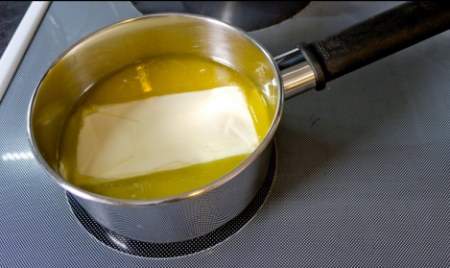
Turn Down Heat and Remove Foam
A foam with rise to the top.
At this point turn your heat down to medium low. You can scoop up some of these bubbles with a a strainer spoon if you wish to see the liquid better.
The bubbles will get bigger and bigger.
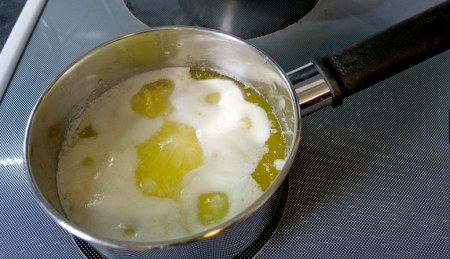
Scrape Off Any Solids
Other solids will sink to the bottom and some will collect on the sides. You can very gently scrape these off the sides and bottom so they are less likely to burn.
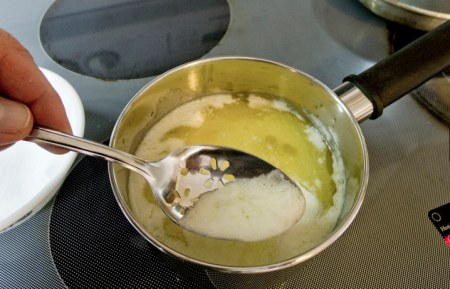
Watch Carefully to Avoid Burning
At a certain point the bubbles will slow down. This is close to finished.
When the water is boiled off the oil will start to heat up rapidly and you have to be careful not to burn it.
The signs your ghee is nearly finished:
- The butter becomes a clear golden yellow liquid (ghee).
- The milk solids separate and settle in the bottom of the pan, and are light brown in color. If you are too dark, you have cooked to much.
- Smaller different kinds of bubble starts to appear at the bottom.
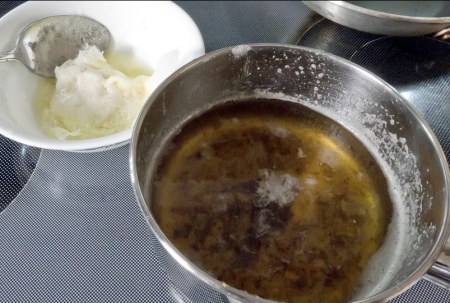
See the smaller bubbles?
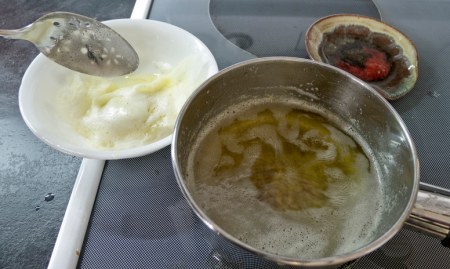
Let the Ghee Cool
Let the mixture cool down for 20 minutes and then run through a double layer of cheesecloth.
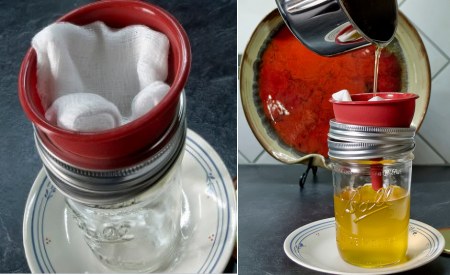
Seal Jar When Your Ghee Cools
Let the ghee cool down completely before sealing the lid.
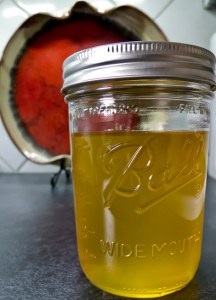
This container is glass so must be kept in the dark. An opaque container with a good lid is also good.
Summary
Learning how to make ghee from butter is a great skill to have in your toolkit. Ghee has a shelf life far longer than butter and is stable at room temperature so can be kept out on the shelf. A number of people even take it with them when they travel as it does not need refrigeration.
Making ghee has become a standard event in our household. How about you?


a few errors here..
* “unsalted butter is harder to do” should be “salted butter”??
* What do you mean by a saucepan with a “good bottom” – as opposed to a “bad” bottom??
* “Let the ghee cook down completely”, you mean “cool down”
Lastly, for a person without allergies or sensitivity to butter, is ghee any better nutritionally?
It says to use unsalted butter then it says that unsalted butter is not a good final product. Which is it?
I think he means ORGANIC unsalted butter is GOOD, but REGULAR, NON-ORGANIC butter is NOT GOOD. Makes sense to me.
Thanks Debra, Ellen and Peter for the editing tips. Will follow through right away. Usually have someone look over everything but missed this time.
Are there any preferred or recommended temperatures to use?
Thank you for these tips. I really want to print this off for myself and friends who don’t have computers, but I don’t want to print all the color pictures (color cartridges are so expensive!). Is there a way I can print the article and recipe without the pictures? Thank you. Doris
Hi Doris. Thanks for your interest. There is a PRINT BUTTON at the bottom of every article (in line with facebook and twitter sharing buttons) which if you click on that – you can very easily eliminate all the photos. The buttons are all only half visible until your mouse over them.
How to make butter from milk that process to be started with. Is it increases cholesterol.
He said exactly what he meant to say and said it correctly. In the parentheses, he was talking about regular unsalted and salted butter being used, but it is not as good as the organic butter.